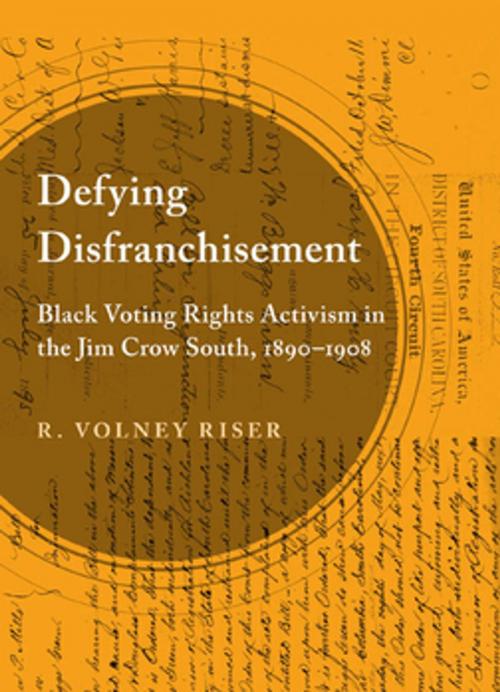Defying Disfranchisement
Black Voting Rights Activism in the Jim Crow South, 1890-1908
Nonfiction, History, Americas, United States, State & Local, Social & Cultural Studies, Social Science, Cultural Studies, African-American Studies, 20th Century| Author: | R. Volney Riser | ISBN: | 9780807146071 |
| Publisher: | LSU Press | Publication: | May 24, 2010 |
| Imprint: | LSU Press | Language: | English |
| Author: | R. Volney Riser |
| ISBN: | 9780807146071 |
| Publisher: | LSU Press |
| Publication: | May 24, 2010 |
| Imprint: | LSU Press |
| Language: | English |
In the late nineteenth and early twentieth century, Jim Crow strengthened rapidly and several southern states adopted new constitutions designed primarily to strip African American men of their right to vote. Since the Fifteenth Amendment to the United States Constitution prohibited eliminating voters based on race, the South concocted property requirements, literacy tests, poll taxes, white primaries, and white control of the voting apparatus to eliminate the region's black vote almost entirely. Desperate to save their ballots, black political leaders, attorneys, preachers, and activists fought back in the courts, sustaining that resistance until the nascent NAACP took over the legal battle.
In Defying Disfranchisement, R. Volney Riser documents a number of lawsuits challenging restrictive voting requirements. Though the U.S. Supreme Court received twelve of these cases, that body coldly ignored the systematic disfranchisement of black southerners. Nevertheless, as Riser shows, the attempts themselves were stunning and demonstrate that African Americans sheltered and nurtured a hope that led to wholesale changes in the American legal and political landscape.
Riser chronicles numerous significant antidisfranchisement cases, from South Carolina's Mills v. Green (1985), the first such case to reach the Supreme Court, and Williams v. Mississippi, (1898), the well-known but little-understood challenge to Mississippi's constitution, to the underappreciated landmark Giles v. Harris -- described as the "Second Dred Scott" by contemporaries -- in which the Court upheld Alabama's 1901 state constitution. In between, he examines a host of voting rights campaigns waged throughout the country and legal challenges initiated across the South by both black and white southerners. Often disputatious, frequently disorganized, and woefully underfunded, the antidisfranchisement activists of 1890--1908 lost, and badly; in some cases, their repeated and infuriating defeats not only left the status quo in place but actually made things worse. Regardless, they brought attention to the problem and identified the legal questions and procedural difficulties facing African Americans.
Rather than present southern blacks as victims during the roughest era of discrimination, in Defying Disfranchisement Riser demonstrates that they fought against Jim Crow harder and earlier than traditional histories allow, and they drew on their own talents and resources to do so. With slim ranks and in the face of many defeats, this daring and bold cadre comprised a true vanguard, blazing trails that subsequent generations of civil rights activists followed and improved. By making a fight at all, Riser asserts, these organizers staged a necessary and instructive prelude to the civil rights movement.
In the late nineteenth and early twentieth century, Jim Crow strengthened rapidly and several southern states adopted new constitutions designed primarily to strip African American men of their right to vote. Since the Fifteenth Amendment to the United States Constitution prohibited eliminating voters based on race, the South concocted property requirements, literacy tests, poll taxes, white primaries, and white control of the voting apparatus to eliminate the region's black vote almost entirely. Desperate to save their ballots, black political leaders, attorneys, preachers, and activists fought back in the courts, sustaining that resistance until the nascent NAACP took over the legal battle.
In Defying Disfranchisement, R. Volney Riser documents a number of lawsuits challenging restrictive voting requirements. Though the U.S. Supreme Court received twelve of these cases, that body coldly ignored the systematic disfranchisement of black southerners. Nevertheless, as Riser shows, the attempts themselves were stunning and demonstrate that African Americans sheltered and nurtured a hope that led to wholesale changes in the American legal and political landscape.
Riser chronicles numerous significant antidisfranchisement cases, from South Carolina's Mills v. Green (1985), the first such case to reach the Supreme Court, and Williams v. Mississippi, (1898), the well-known but little-understood challenge to Mississippi's constitution, to the underappreciated landmark Giles v. Harris -- described as the "Second Dred Scott" by contemporaries -- in which the Court upheld Alabama's 1901 state constitution. In between, he examines a host of voting rights campaigns waged throughout the country and legal challenges initiated across the South by both black and white southerners. Often disputatious, frequently disorganized, and woefully underfunded, the antidisfranchisement activists of 1890--1908 lost, and badly; in some cases, their repeated and infuriating defeats not only left the status quo in place but actually made things worse. Regardless, they brought attention to the problem and identified the legal questions and procedural difficulties facing African Americans.
Rather than present southern blacks as victims during the roughest era of discrimination, in Defying Disfranchisement Riser demonstrates that they fought against Jim Crow harder and earlier than traditional histories allow, and they drew on their own talents and resources to do so. With slim ranks and in the face of many defeats, this daring and bold cadre comprised a true vanguard, blazing trails that subsequent generations of civil rights activists followed and improved. By making a fight at all, Riser asserts, these organizers staged a necessary and instructive prelude to the civil rights movement.















